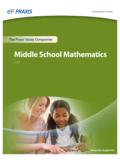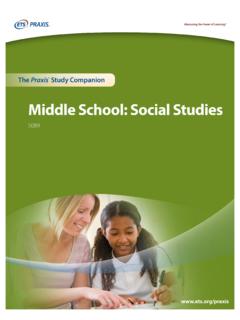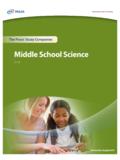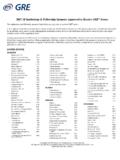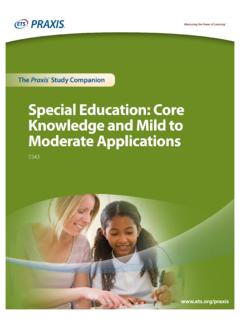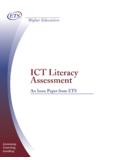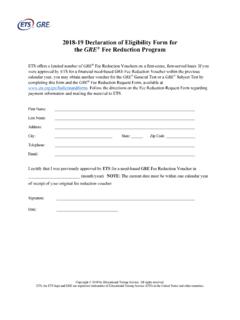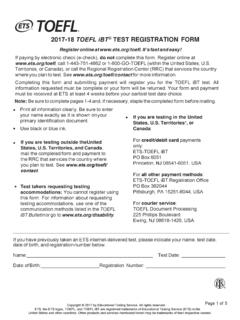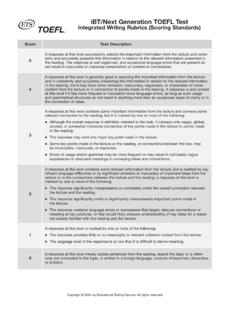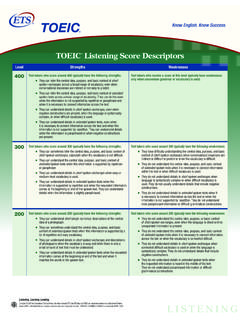Transcription of Library Media Specialist (5311) Study Companion
1 The Praxis Study Companion Library Media Specialist (5311) Praxis Study CompanionWelcome to the Praxis Study CompanionWelcome to the Praxis Study Companion Prepare to Show What You KnowYou have been working to acquire the knowledge and skills you need for your teaching career. Now you are ready to demonstrate your abilities by taking a Praxis test. Using the Praxis Study Companion is a smart way to prepare for the test so you can do your best on test day. This guide can help keep you on track and make the most efficient use of your Study Study Companion contains practical information and helpful tools, including: An overview of the Praxis tests Specific information on the Praxis test you are taking A template Study plan Study topics Practice questions and explanations of correct answers Test-taking tips and strategies Frequently asked questions Links to more detailed informationSo where should you start?
2 Begin by reviewing this guide in its entirety and note those sections that you need to revisit. Then you can create your own personalized Study plan and schedule based on your individual needs and how much time you have before test in mind that Study habits are individual. There are many different ways to successfully prepare for your test. Some people Study better on their own, while others prefer a group dynamic. You may have more energy early in the day, but another test taker may concentrate better in the evening. So use this guide to develop the approach that works best for teaching career begins with preparation. Good luck!Know What to ExpectWhich tests should I take? Each state or agency that uses the Praxis tests sets its own requirements for which test or tests you must take for the teaching area you wish to you register for a test, confirm your state or agency s testing requirements at are the Praxis tests given?
3 Praxis tests are given on computer. Other formats are available for test takers approved for accommodations (see page 35).3 The Praxis Study CompanionWelcome to the Praxis Study CompanionWhat should I expect when taking the test on computer?When taking the test on computer, you can expect to be asked to provide proper identification at the test center. Once admitted, you will be given the opportunity to learn how the computer interface works (how to answer questions, how to skip questions, how to go back to questions you skipped, etc.) before the testing time begins. Watch the What to Expect on Test Day video to see what the experience is and when are the Praxis tests offered?You can select the test center that is most convenient for you. The Praxis tests are administered through an international network of test centers, which includes Prometric Testing Centers, some universities, and other locations throughout the schedules may differ, so see the Praxis web site for more detailed test registration information at 4 Table of ContentsTable of ContentsThe Praxis Study Companion guides you through the steps to success1.
4 Learn About Your Test ..5 Learn about the specific test you will be taking2. Understanding Question Types ..13 Become comfortable with the types of questions you ll find on the Praxis tests3. Practice with Sample Test Questions ..15 Answer practice questions and find explanations for correct answers4. Determine Your Strategy for Success ..26 Set clear goals and deadlines so your test preparation is focused and efficient5. Develop Your Study Plan ..29 Develop a personalized Study plan and schedule6. Review smart Tips for Success ..33 Follow test-taking tips developed by experts7. Check on Testing Accommodations ..35 See if you qualify for accommodations to take the Praxis test8. Do Your Best on Test Day ..36 Get ready for test day so you will be calm and confident9. Understand Your Scores ..38 Understand how tests are scored and how to interpret your test scoresAppendix: Other Questions You May Have.
5 40 The Praxis Study CompanionStep 1: Learn About Your Test1. Learn About Your TestLearn about the specific test you will be takingLibrary Media Specialist (5311)Test at a GlanceTest Name Library Media SpecialistTest Code 5311 Time 2 hoursNumber of Questions 120 Format Selected-response questionsTest Delivery Computer delivered Approximate Approximate Content Categories Number of Percentage of Questions Examination I. Program Administration 21 18% II. Collection Development 26 21% III. Information Access and Delivery 26 21% IV. Learning and Teaching 33 28% V. Professional Development, 14 12% Leadership, and AdvocacyVIVIIIIIIA bout This TestThe Library Media Specialist test is designed to measure the knowledge and abilities of examinees who have had preparation in a program for school Library Media specialists, grades K 12.
6 Because programs in school librarianship are offered at both the undergraduate and graduate levels, the test is appropriate for examinees at either test is aimed at the level of knowledge appropriate for the person who is responsible for administering the Library Media program at the individual school level. The content generally parallels the knowledge and skills in Empowering Learners: Guidelines for school Library Media Programs and the ALA/AASL Standards for Initial Preparation of school Librarians (2010).The test content is aimed at the level of knowledge appropriate for the person who is responsible for administering the Library Media program at the individual school level. The material in the test, therefore, would not be suitable for those in systems with differentiated staffing or for those at the district 120 selected-response questions cover program administration; collection development; information access and delivery; learning and teaching; and professional development, leadership, and test may contain some questions that will not count toward your Praxis Study Companion5 The Praxis Study Companion6 Step 1: Learn About Your TestContent TopicsThis chapter is intended to help you organize your preparation for the test and to give you a clear indication of the depth and breadth of the knowledge required for success on the all accredited undergraduate or graduate Library Media programs address the majority of these topics, subtopics, and even minor topics.
7 Moreover, the content of the Library Media Specialist test generally parallels the knowledge and skills in Empowering Learners: Guidelines for school Library Media Programs and in the ALA/AASL Standards for Initial Preparation of school Librarians (2010) . You will find much similarity between the content of Empowering Learners and the ALA/AASL Standards and the content of the Library Media Specialist test. For example, Media specialists exhibit specific behaviors with regard to teaching and learning. Goals and principles related to these behaviors are reflected in Empowering Learners, and explanations and evidence of these target behaviors are reflected in the ALA/AASL Standards. The Library Media Specialist test will assess your knowledge of this same is true for other critical areas of the test, such as Program administration Collection development Information access and delivery Professional development, leadership, and advocacyFamiliarizing yourself with both the ALA/AASL Standards and Empowering Learners, in addition to reviewing your course work, will give you a good foundation for preparing for your Library Media Specialist not to be overwhelmed by the volume and scope of content knowledge in this guide.
8 Although a specific term may not seem familiar as you see it here, you might find you can understand it when applied to a real-life situation. Many of the items on the actual test will provide you with a context to apply to these topics or AreasInterspersed throughout the Study topics are discussion areas, presented as open-ended questions or statements. These discussion areas are intended to help test your knowledge of fundamental concepts and your ability to apply those concepts to situations in the classroom or the real world. Most of the areas require you to combine several pieces of knowledge to formulate an integrated understanding and response. If you spend time on these areas, you will gain increased understanding and facility with the subject matter covered on the test. You may want to discuss these areas and your answers with a teacher or that this Study Companion does NOT provide answers for the discussion area questions, but thinking about the answers to them will help improve your understanding of fundamental concepts and will probably help you answer a broad range of questions on the Program AdministrationProgram Administration is the organization, administration, and evaluation of the Library Media program.
9 Successful Library Media programs are well organized and reach out to all facets of the learning community, providing materials and services to meet all educational needs. To prepare for items addressing this portion of the test, you should refer to your texts from course work addressing program administration, as well as to chapters 1 and 3 of Empowering Learners. Program Administration covers the following areas:A. Organization, administration, and evaluation of the Library Media center1. Organizationa. shared decision makingb. philosophy and mission statementsc. goals and objectives for programsd. short- and long-range planninge. needs assessmentsf. promotion of programs, resources, and services to students, staff, and communityB. Management1. Budgetinga. short- and long-term financial objectivesb. prioritizing budgetary needsc. articulating and justifying budgetary needsd. tracking spendingThe Praxis Study Companion7 Step 1: Learn About Your Teste.
10 Evaluating budget plansf. developing a budget collaborativelyg. alternate means of funding2. Supervising staffa. roles and responsibility of staff, including volunteersb. training and professional growthc. communicating goals and plans to the Library staffd. formal and informal evaluation processesC. Policies and Procedures1. Policies and procedures for Library Media center operationa. rationale for key policies circulation borrowing interlibrary loan selection acceptable use reconsideration materials donation conductb. legal and ethical issues related to policies and procedures local authority approval due process challenged materials confidentiality intellectual freedom equal accessDiscussion areas: Program Administration What are some of the tools Library Media specialists use to evaluate the effectiveness of their programs? What methods might the Library Media Specialist use to conduct a needs assessment to identify and prioritize curricular, student, and staff needs?
